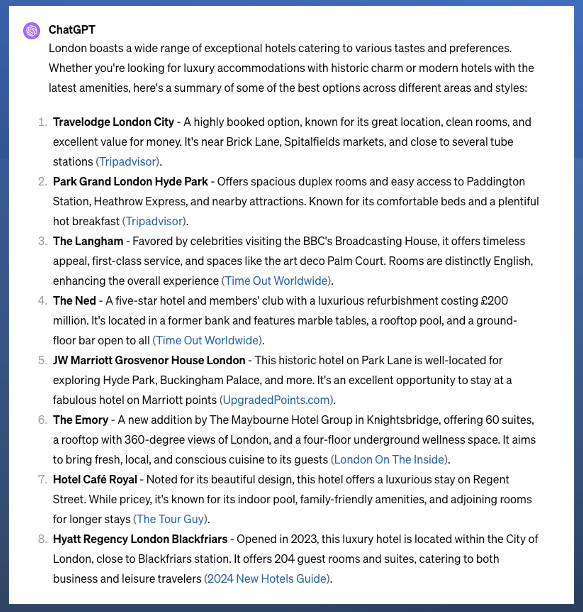SGE Launch Date, AI & Section 230, ChatGPT's New Links

Rumor: SGE Will Launch at Google I/O
Google has begun exposing SGE results to some users not enrolled in Google Labs. And there's new SEO speculation that Google will formally roll out SGE at its developer conference, Google I/O, on May 14. Originally Google said SGE would become generally available in December 2023 but that deadline came and went. Then, in a January 17 blog post, Google explained it would "continue to offer SGE in Labs as a testbed for bold new ideas." That suggested, and we agreed, that SGE would never formally launch but that AI-search features would slowly make their way into the SERP. But the totality of evidence, including Liz Reid's elevation to Search VP, now argues that a formal rollout of SGE is coming. Google's public remarks about audience reactions suggests that the response has largely been positive. But they're also not going to say anything negative publicly. The current state of SGE and the quality of its information is imperfect at best. Most third party research and analysis, which doesn't yet include direct user testing, suggests a negative impact on publisher traffic and even on direct brand queries.

Our take:
- According to Authoritas, more than 90% of keywords generate some form of SGE result, including those that require 'Generate' or 'Show More.'
- There are potential implications for local in SGE's launch, since Google Maps/Local is one of the top sources linked in SGE results.
- Despite the pushing-down-the-page phenomenon, once again, we won't really know anything until we have some user engagement data.
Gen-AI May Turn Google into a 'Publisher'
Big tech platforms have consistently used Section 230 of the Communications Decency Act to avoid liability – some would argue responsibility – for harms arising out of the content on their sites. The intent of the provision, enacted in 1996, was to protect nascent internet startups from being sued out of existence. Section 230(c)(1) says, "No provider or user of an interactive computer service shall be treated as the publisher or speaker of any information provided by another information content provider." As a practical matter this has meant total immunity from liability for Meta, Google, Microsoft, Twitter/X and others. Now, unwittingly, AI may have done (or be about to do) what plaintiffs and legislators could not: overcome Section 230 immunity. The recent US Supreme Court case Gonzalez v. Google raised this possibility although didn't decide the question. Justice Gorsuch said the following during oral argument, "artificial intelligence generates poetry, it generates polemics today. That [ ] would be content that goes beyond 'picking, choosing, analyzing, or digesting' ... And that is not protected." As the Wall Street Journal points out, this position now creates significant legal uncertainty for tech companies and especially for search engines and social media.

Our take:
- It's not clear how many other SCOTUS members share Gorsuch's position on Section 230 and AI. But it's possible a majority could.
- As generative AI becomes broadly infused into search engines, online productivity suites and social sites, the door is open to liability.
- It's also possible that courts or legislators could extend Section 230's protections to AI. But that seems unlikely in the current climate.
ChatGPT Links = More Search Competition
Last Friday OpenAI announced that ChatGPT was getting "more prominent links" (see example below). Rather than just a link indicator, you can now see the specific source from which the information comes. It may seem like a small thing but it's not. First off, SEOs will be happy. But more importantly, this will help instill greater trust in the content generated. According to a recent Pew survey users are distrustful or cautious of AI-generated answers in some cases. That same survey found that (only) 23% of US adults have ever used ChatGPT; however the number is 43% for people under 30. Among technology industry workers, I would speculate the number is closer to 90% or more. Overall, ChatGPT has greater awareness, and usage, than Google Bard/Gemini – although Google is trying to change this by putting Gemini messages and badges all over its products. The addition of more obvious links/sources in ChatGPT will give people more confidence in the results they're seeing. The move comes as OpenAI no longer requires account creation to use the site.

Our take:
- Sam Altman has said he doesn't want to "build a better Google" but reimagine the search experience instead.
- Early predictions of Google's imminent demise at the hands of AI were obviously wrong, but some usage is starting to migrate, although some argue it will be additive to search rather than a substitution for Google.
- As I've said in other contexts, between ChatGPT, Perplexity, Copilot and, to a lesser degree, Claude, my Google usage is down by at least 50%.
Recent Analysis
- Near Media podcast: Google goes to Brussels and attempts to defend their DMA compliance.
- Google Redefines Local Services to Avoid DMA Compliance Consequences, by David Mihm & Mike Blumenthal.
Short Takes
- Google testing EU-style local "aggregator carousel" in US.
- Perplexity sets off on the road to perdition: ads coming.
- Might AI enable an alternative to reviews for products, businesses?
- Quora and Reddit gain massively from recent Google update.
- Google must destroy improperly collected Incognito data (WSJ).
- Is Google replacing search Notes with Comments?
- Google's John Mueller: too much focus on links a waste of time.
- Still no recoveries from September Helpful Content Update.
- Terms like "do what's best for users" are ambiguous.
- OpenAI is announcing Synthetic Voices, what could go wrong?
- Eight EU countries without DSA regulators after the deadline has passed.
- Microsoft and OpenAI to collaborate on $100 billion supercomputer.
- Yahoo buying AI news aggregator Artifact.
- Amazon's Just Walk Out tech may be on the way out.
Listen to our latest podcast.

How can we make this better? Email us with suggestions and recommendations.

